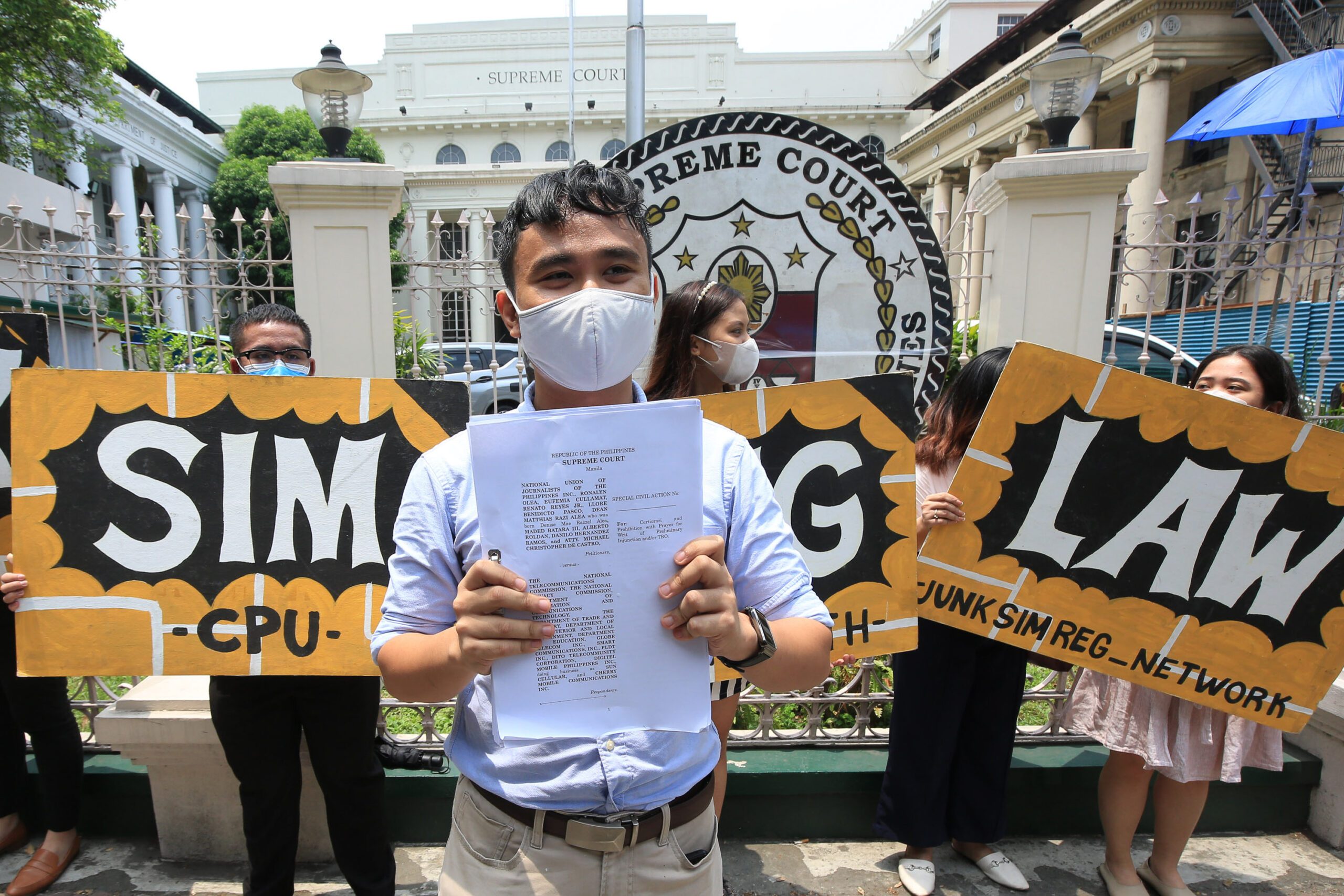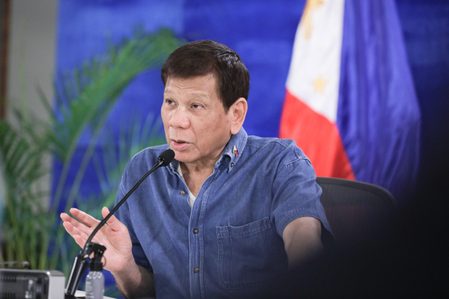SUMMARY
This is AI generated summarization, which may have errors. For context, always refer to the full article.

MANILA, Philippines – Days before the deadline for SIM card registration, the National Union of Journalists of the Philippines (NUJP) and other groups filed a petition before the Supreme Court (SC), asking the High Court to declare the law requiring registration unconstitutional.
The petition was filed before the tribunal on Monday, April 17, assisted by counsels from the National Union of Peoples’ Lawyers and Leflegis Legal Services.
The named petitioners are as follows:
- NUJP, represented by its chairperson Jonathan de Santos
- Bulatlat editor-in-chief Ronalyn Olea
- Former Bayan Muna lawmaker Eufemia Cullamat
- Bagong Alyansang Makabayan secretary general Renato Reyes
- Kilusang Magbubukid ng Pilipinas chairperson Danilo Ramos
- PAMALAKAYA vice president for Luzon Alberto Roldan
- Samahan ng mga Maralitang Taga-Batasan Hills Inc. president Llore Pasco
- Dean Matthias Razi Timtiman Alea
- Data privacy advocate Maded Batara III
- Lawyer Michael Christopher de Castro, Leflegis Legal Services founder
Among the named respondents in the petition are the National Telecommunications Commission, Department of Information and Communications Technology, National Privacy Commission, Department of Trade and Industry, Department of the Interior and Local Government, and the Department of Education.
Aside from the government, some telecommunications companies were also named respondents. These include Globe Telecom, PLDT, Smart, Digitel Mobile Philippines, Inc. (Sun Cellular), DITO, and Cherry Mobile.
President Ferdinand Marcos Jr. on October 10, 2022 approved the SIM Card Registration Act, which requires Filipinos to register their SIM cards using any government-issued identification. This is supposedly intended to combat fraud, according to authorities.
Many groups have been opposing the law over privacy concerns. Before relinquishing his post, former president Rodrigo Duterte had vetoed the SIM card and social media registration bill, citing concerns about free speech and data privacy.
What the petition is about
The petitioners asked the SC to issue a temporary restraining order or writ of preliminary injunction to block the government from implementing the law. They also asked the tribunal to declare the law unconstitutional under Article III, sections 1, 2, 3, and 11 of the 1987 constitution.
Under the petition, the groups are also asking the SC to order the public telecommunications entities to cease and desist from “using, storing, transferring, and, processing all information gathered into the SIM register and to DESTROY data already gathered.”
In questioning the law before the High Court, the groups filed a petition for certiorari and prohibition under rule 65 of the Rules of Civil Procedure and article VIII, Section 1 of the 1987 Constitution. The groups lodged the petition on the following grounds:
- The petition raises violations of freedom of speech “and its cognate rights in a facial challenge that underscores regulatory overbreadth.”
- It presents issues that must be addressed “at the most immediate time.”
- It concerns the nexus between freedom of speech and its cognate rights, and the right against unreasonable searches and seizures.
The petitioners also explained that the exercise of judicial review is needed because:
- There is an actual case or controversy because the supposed activation of SIM cards might “take away” the petitioners’ freedom of speech, expression, and its cognate rights.
- They posses locus standi or legal standing in the case because the “injury” of the SIM card registration might affect them. They also invoked a third-party standing because of the law’s “chilling effect.”
- The question of constitutionality is the very lis mota or cause of the petition because the petitioners are required by the law “to choose between their freedom of speech and their privacy.”
What are the petitioners’ arguments?
In their petition, the groups raised four arguments to convince the High Court to declare the SIM Card Registration law unconstitutional.
Violation of freedom of speech and its cognate rights
Petitioners said the law violates freedom of speech enshrined under the 1987 Constitution by imposing prior restraint.
- According to the petition, the law conditions the exercise of speech through the use of SIM cards to a mandatory disclosure of information “that is supposed to tie every SIM card to a specific person.” The petitioners cited a part of the law that seeks to give “law enforcement agencies the tools to resolve crimes which involve its utilization and a platform to deter the commission of wrongdoings.”
- The groups said nondisclosure leads to enforced silence and that the law presumes that every Filipino is a suspected criminal.
- The law should be found “constitutionally impermissible prior restraint” because it is against the constitutional standards and history that prevent laws like the Licensing of the Press Act of 1662. The centuries-old law from the West used to prohibit printing without prior registration.
- The petitioners said compelled speech against a person’s conscience could be considered constitutionally impermissible as enforced silence.
- In their petition, the groups also raised the implications of the law such as: only minority of the population will be reached by public service announcement from the government; some will be locked out of essential online services and will lose the ability to use one-time passwords (OTPs).

Violation of right vs. unreasonable searches and seizures, privacy of communication
The law violates the right to unreasonable searches and seizures, as well as the right to privacy of communication by intruding upon the people’s reasonable expectation of privacy and “circumventing the requirement of a judicial warrant,” according to the petitioners.
- The petitioners explained that people have a reasonable expectation of privacy in their SIM cards, including their right to control who can keep or pass on the information they contain. However, the compelled disclosure by the law not backed by a warrant could be considered unreasonable search, according to the groups.
- The law also intrudes and violates people’s expectations of privacy by allowing law enforcement access through a simple subpoena, and not court-issued warrants.
- Under the law in question, law enforcement can assume the identity of any registered Filipino through his or her SIM cards and intercept all communications and data present there. This could happen even in cases where the owners of SIM cards are unverified.
Violation of due process
The petitioners argued that the SIM Card Registration law violates substantive due process by intruding into the life, liberty, and property of the people.
- All unregistered Filipinos might lose their right to “‘engage in any of the common occupations of life [and] to acquire useful knowledge” because of the impending deactivation of their SIM cards.
- Aside from this, among the petitioners who will be more affected are Renato Reyes, whose decisional privacy right of parents to secure and educate their children might be affected; and petitioner Alea, whose decisional privacy right to define one’s identity, might also be affected.
Violation of free access to courts
The Sim Card Registration law violates free access to courts by limiting access to justice to only registered devices.
- The petitioners pointed out the judiciary’s use of technology, adding that the SC’s technology-driven rules have “breathed new life into citizens’ rights to the speedy disposition of their cases and to free access to courts.” These things rely on a foundation “built on unimpeded access to SIM cards.”
- The law affects access to justice by operating to impair access to justice and undo the purposeful intention of this Court to “safeguard the rights and meaningful freedoms of all persons.”
– Rappler.com
Add a comment
How does this make you feel?










There are no comments yet. Add your comment to start the conversation.